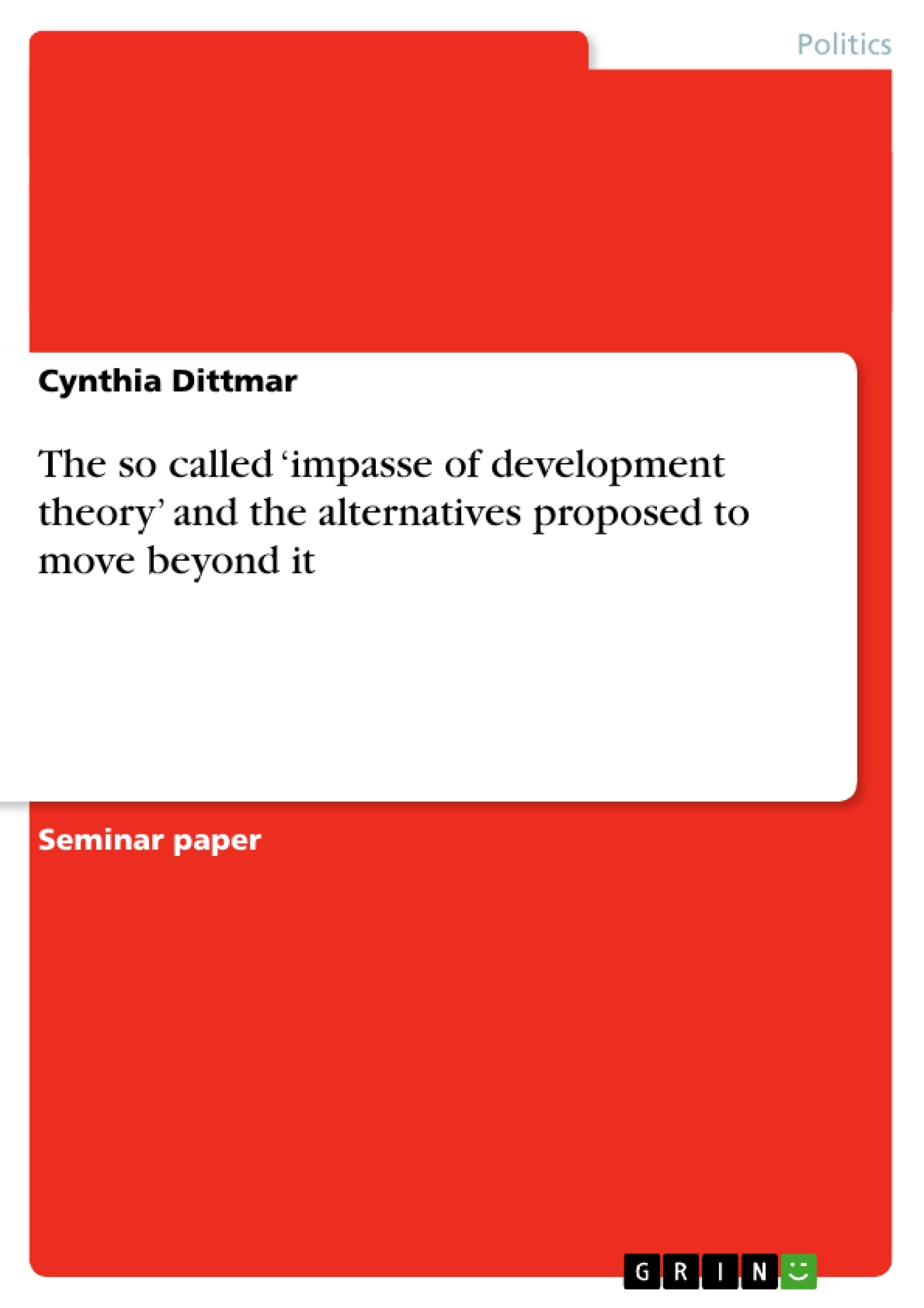Excerpt
Table of Contents
1. Introduction – The impasse of development studies
2. Alternative Development
Alternative vs. Mainstream development – the case of the feminist empowerment approach
3. Post Development
Critique on post development thinking
4. Conclusion
Literature
1. Introduction – The impasse of development studies
In the mid 1980s development studies experienced a crisis, the often called impasse of development theory and policy (Schuurmann 1993). The reasons can be found on the level of development thinking and of “real-world changes and problems” (Simon 2003: 6). Development thinking got stuck in a cul-de-sac as both grand meta-narratives of development theory – Modernisation theory and radical Marxist approaches – lost their hegemony: radical alternative theories, based on Marxist and neo-Marxist political economy were discredited by the collapse of socialism. Modernisation theory, based in neoclassical economics did not seem to deliver many benefits as economic growth turned out to produce more ecological, social and economical problems than it solved (ibid.). It became clear that growth and the neo-liberal agenda with its structural adjustment programs (SAP)[1] in the 1980s and 1990s was not necessarily connected to other development goals like employment creation, reduction of inequality and poverty or the provision of basic needs.
The acceleration of globalisation and with it the questioning of the nation state as a “trusted point of reference” (Schuurman 2000: 7) of development studies intensified the crisis of development theory. Moreover new theoretical approaches like feminism, post modernism and post colonialism, and the growing recognition of heterogeneity of the third world, challenged development studies and theory even more (Schuurman 1993).
There have been two major reactions to the impasse of development theory and policy. The first reaction was the search for development alternatives with the intention of reforming and redefining the goals of development. The second reaction, post development thinking, was more radical as it rejects development as a whole.
However, development studies and practice survived the impasse and is back on the agenda: “a flourishing industry centred on social capital and social development has arisen in the World Bank, the UNDP and other multilateral institutions” (Hart 2001: 649). This paper aims to review alternative development (section 2) and post development (section 3), and analyses which contributions have helped to overcome the impasse.
2. Alternative Development
In the following I will critically analyse alternative development. First I will introduce the concept and its critiques. These critiques will then be analysed in a case study about the implementation of the feminist empowerment approach into mainstream development and the conclusion discusses whether alternative development offers a way forward for development thinking despite its criticisms.
Brohmann (1996) speaks of a body of alternative development theory whereas Pieterse points out that development can also be seen as “a loose profile of critical sensibilities and alternative practices” to mainstream development[2] (Pieterse 1998). Feminist, ecological or sustainable, rights-based, participations and empowerment approaches, are some examples of the manifold proposals piled under the label alternative development (Sylvester 1999).
Despite many differences, there are however some unifying features of alternative development approaches: the main intention is to rethink the role of states, markets and civil society in the development process. It is about the introduction of new practices, the redefinition of the objectives and values of development and a new focus on alternative agents of development than nation states and development agencies – nongovernmental organisations (NGOs) and the local people themselves. Alternative development proposes therefore a participatory and people-centred “development from below” (Pieterse 1998: 345). An important and unifying goal is to satisfy basic needs, which implies a return to the poverty emphasis of development which was lost during the modernisation and structural adjustment eras. “In all cases, the idea is to present an alternative to the market forces paraded by neo-liberalism and to states that often fail to deliver development to their citizens” (Sylvester 1999: 708).
According to Pieterse (1998) alternative development presents more a “roving critique” and loosely connected proposals and methodologies than an “an alternative development paradigm” (p. 345). The theoretical idea is that there is a dialectical relationship between alternatives and mainstream, which means that there is an influential connection in both directions – changes in the mainstream will evoke changes in alternative theory and the other way round. Pieterse argues that alternative development cannot serve as a new paradigm because it does not offer a coherent body of theory; many different alternative approaches do not refer methodologically to each other. Moreover some approaches may even clash with each other (e.g. ethno development vs. eco development, feminism vs. indigenous culture etc.).
[...]
[1] The SAPs were part of the conditions of the granting of credits to developing countries of the Bretton Woods institutions, International Monetary Fund (IMF) and World Bank, in the 1980s and 1990s. In order to secure the repayment ability, the indebted countries were forced to shortages of public services, especially in the health and education sector, and to privatisation of state owned enterprises and public goods (Rodenberg 2003).
[2] Following Pieterse (1998) mainstream development here refers to everyday talk about development in international institutions and development co-operation and in developing countries.
- Quote paper
- Cynthia Dittmar (Author), 2008, The so called ‘impasse of development theory’ and the alternatives proposed to move beyond it, Munich, GRIN Verlag, https://www.grin.com/document/131930
Publish now - it's free






















Comments